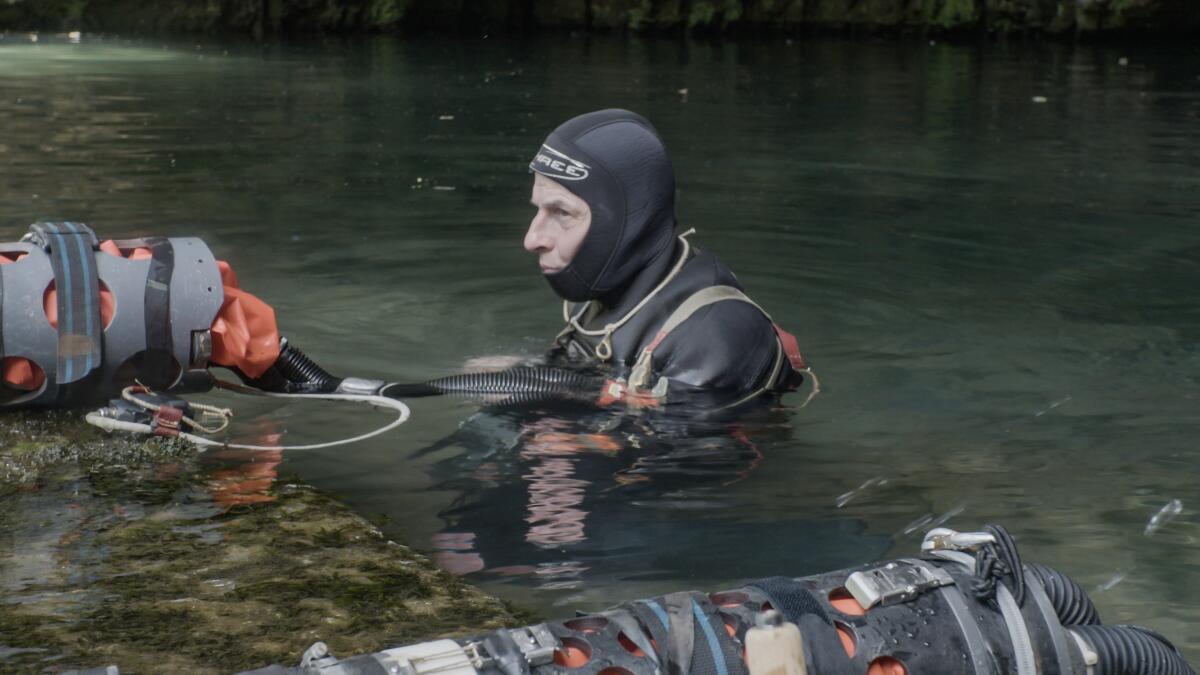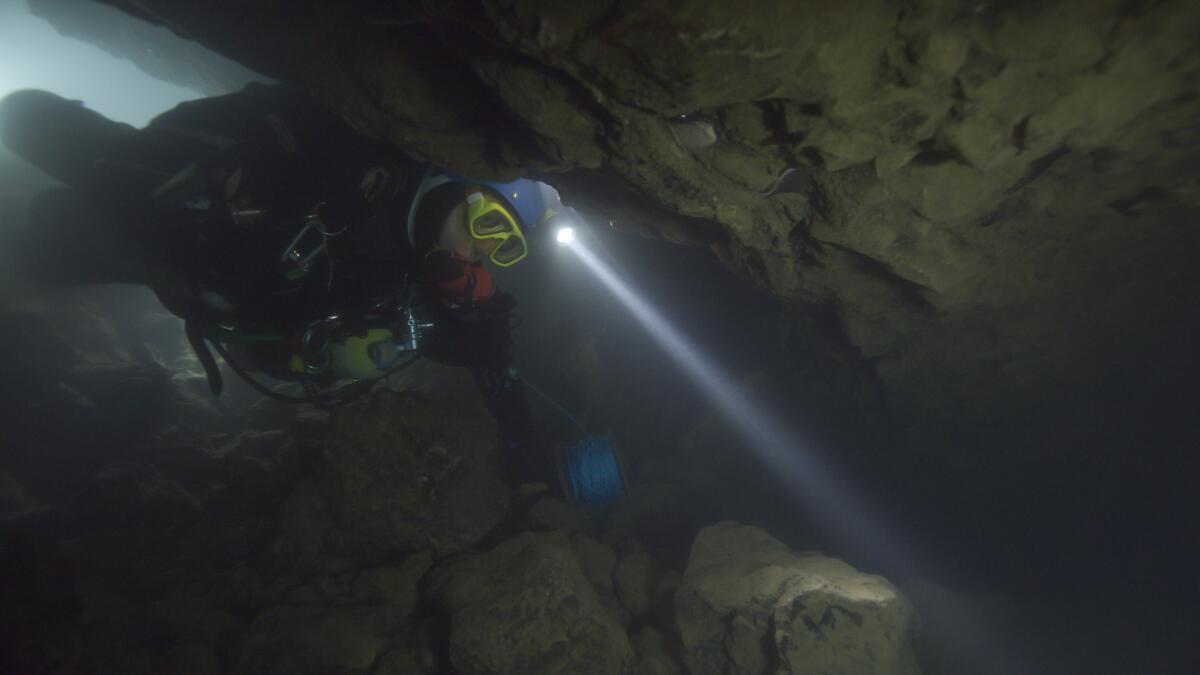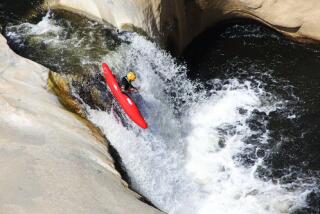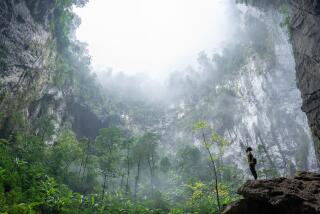Review: ‘The Rescue’ is a solid, suspenseful nonfiction retelling of the 2018 Thai cave rescue

- Share via
The Times is committed to reviewing theatrical film releases during the COVID-19 pandemic. Because moviegoing carries risks during this time, we remind readers to follow health and safety guidelines as outlined by the Centers for Disease Control and Prevention and local health officials.
Chances are you were one of the many captivated by headlines emerging from Thailand’s Chiang Rai province in 2018, when 12 young soccer players and their coach were trapped for weeks in the flooded Tham Luang cave system. Even so, prepare to shed a tear or two when you first glimpse those boys’ smiling faces in the “The Rescue” peering gratefully out of the darkness at the first beam of light they’ve seen in 10 days. It’s an astonishing piece of footage that was broadcast all over the world, but it packs an extra wallop in the context of this documentary, offering a moment’s sweet relief — a much-needed breather — in a story whose happy ending was anything but foreordained.
That story began on June 23, 2018, when celebrating members of the Wild Boars soccer team entered Tham Luang, a favorite stamping ground, not realizing that the fast-approaching monsoon season was about to get an early start. Sudden rains and rising floodwaters trapped the boys and their coach deep in the cave’s labyrinthine passageways. The government mobilized a massive rescue effort and sent in the Thai navy SEALs, but it soon became clear that to find (let alone rescue) the missing children, they would need expert help. They found it in two middle-aged British divers, Rick Stanton and John Volanthen, men whose idea of a good time involved swimming through underwater caverns with little wiggle room and even less visibility.
“It’s probably some people’s worst nightmare,” another diver notes, and “The Rescue,” which is being released in theaters by National Geographic, tries hard to bring that nightmare to life, with images that are dark, murky, eerie and entrancing by turns. While the effect is more illustrative than viscerally immersive, the directors, Elizabeth Chai Vasarhelyi and Jimmy Chin, bring us as close to the experience as possible. As they lay out the daunting logistics with brisk, suspenseful clarity, they also seamlessly mix shots of the divers at work in Tham Luang with reenactments filmed in a water tank at England’s Pinewood Studios. (The documentary’s intricate weave of news coverage, locally shot videos, 3-D cave maps and talking heads was skillfully assembled by the editor Bob Eisenhardt.)

Mostly, though, the filmmakers are content to spend time with the divers on dry land, chiefly Stanton and Volanthen, though we also meet some members of the crack diving team they eventually assembled. No less than in their Oscar-winning, vertigo-inducing mountain-climber documentary, “Free Solo,” Vasarhelyi and Chin show a deep affinity for daredevil minds, and here they achieve another sly balance of extreme-sports primer and oddball psychological profile. Their conclusion, articulated by many of the divers themselves, is that this particular hobby thrives especially among athletes of a lonelier, more introverted bent, the kind who would find the lower depths not isolating or terrifying but liberating.
Stanton and Volanthen’s ability to withstand the strong currents and navigate the cave’s serpentine corridors helped them locate four pump workers who’d also gotten stranded and, eventually, the boys and their coach, perched on a rock shelf about 2½ miles from the mouth of the cave. But amid the worldwide rejoicing over this discovery, it soon became clear that finding the boys would be the easy part. Getting them out alive would prove infinitely more difficult, and from here “The Rescue” becomes a gripping chronicle of high-stakes troubleshooting, propelled by diver testimony about the impossible conditions they faced and goosed by the tense notes of Daniel Pemberton’s score.
Along the way there are worrying setbacks (rising water levels, diminishing oxygen levels) and improbable breakthroughs, the most significant being the divers’ decision to sedate the boys and float them out — an enormously risky plan unpacked here by the Australian anesthetist and cave diver Dr. Richard Harris, whose work would prove crucial to the mission’s success. There is also one major tragedy: The filmmakers duly acknowledge the heroic courage of Saman Gunan, a retired Thai navy SEAL who drowned during the rescue effort. His story stands out in a movie that strives to foreground Thai perspectives through scattered interviews with officials and volunteers, and also through occasional insights into the story’s local, spiritual underpinnings. We learn about the mythology of the surrounding Nang Non mountain range, and we see and hear prayers being offered up for the boys’ safe return.
If the movie’s access to the divers is its major coup, its most obvious omission is any direct testimony from the boys themselves — a casualty of the complex battle for story rights that began practically the moment the last individual made it out of Tham Luang safely. (One screen dramatization has already been released in Thailand; higher-profile ones are in the works.) “The Rescue” is a gripping, unsurprisingly moving early account, one that emphasizes the pluck and ingenuity of its heroes and the resilience and beauty of its survivors. To say that it feels necessarily incomplete is to acknowledge the extraordinary and extraordinarily multifaceted story it has to tell.
‘The Rescue’
In English and Thai with English subtitles
Rated: PG, for thematic material involving peril and some language
Running time: 1 hour, 47 minutes
Playing: Starts Oct. 8 at AMC the Grove 14, Los Angeles, and the Landmark, West Los Angeles
More to Read
Only good movies
Get the Indie Focus newsletter, Mark Olsen's weekly guide to the world of cinema.
You may occasionally receive promotional content from the Los Angeles Times.









